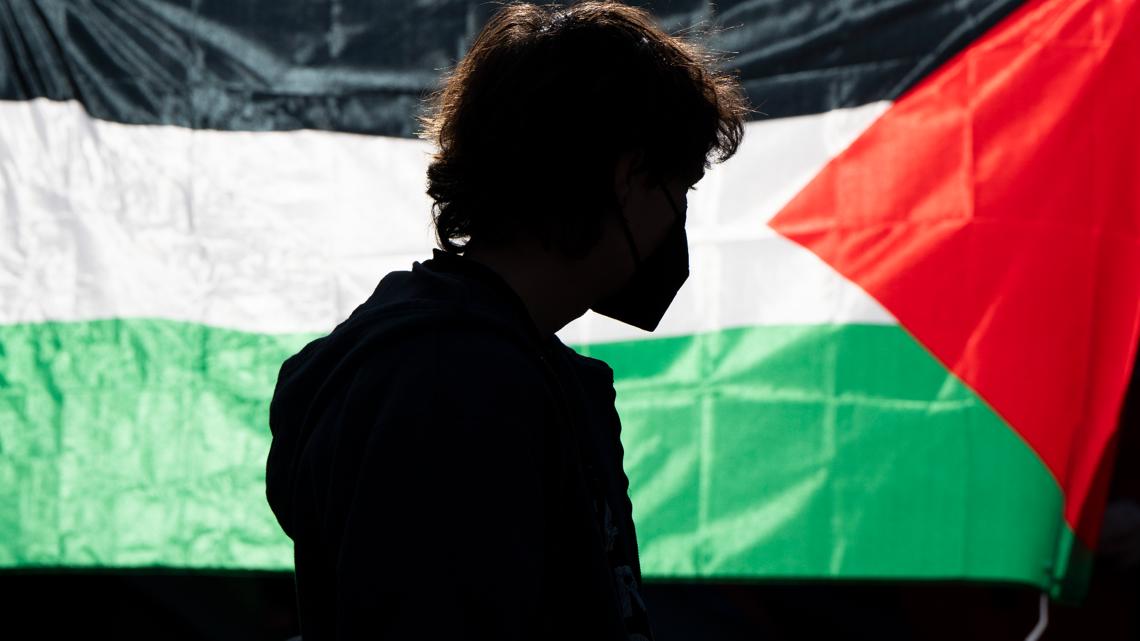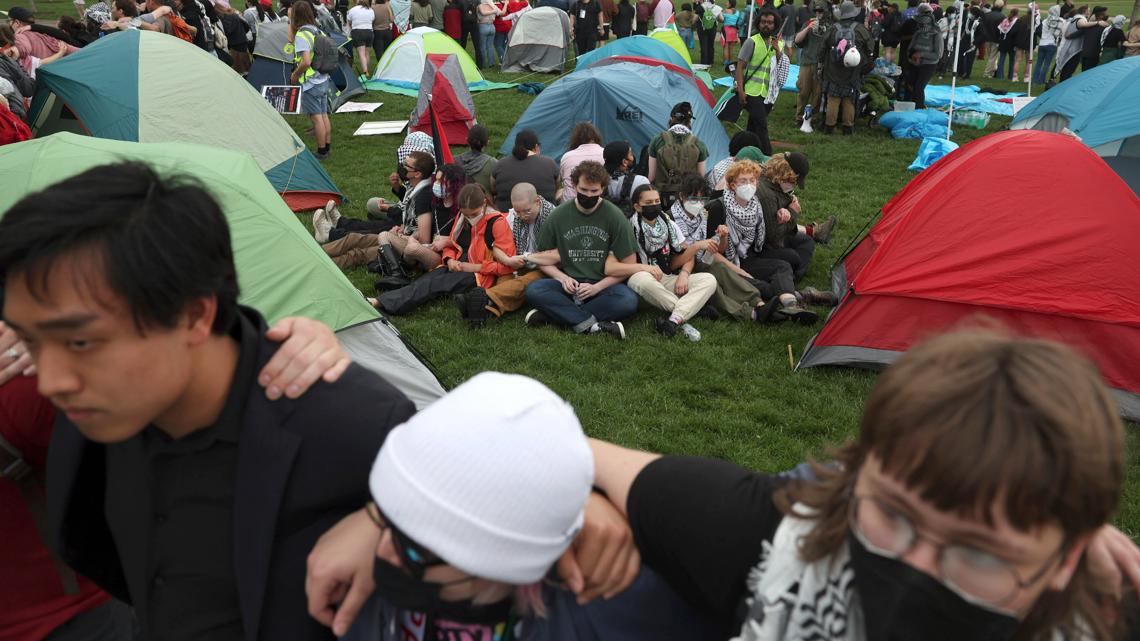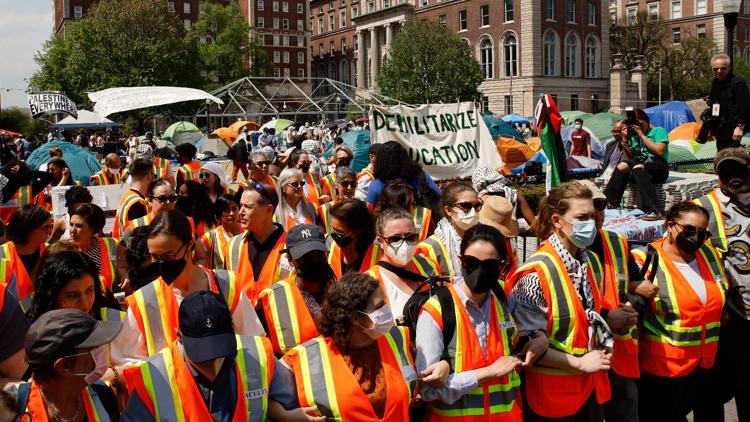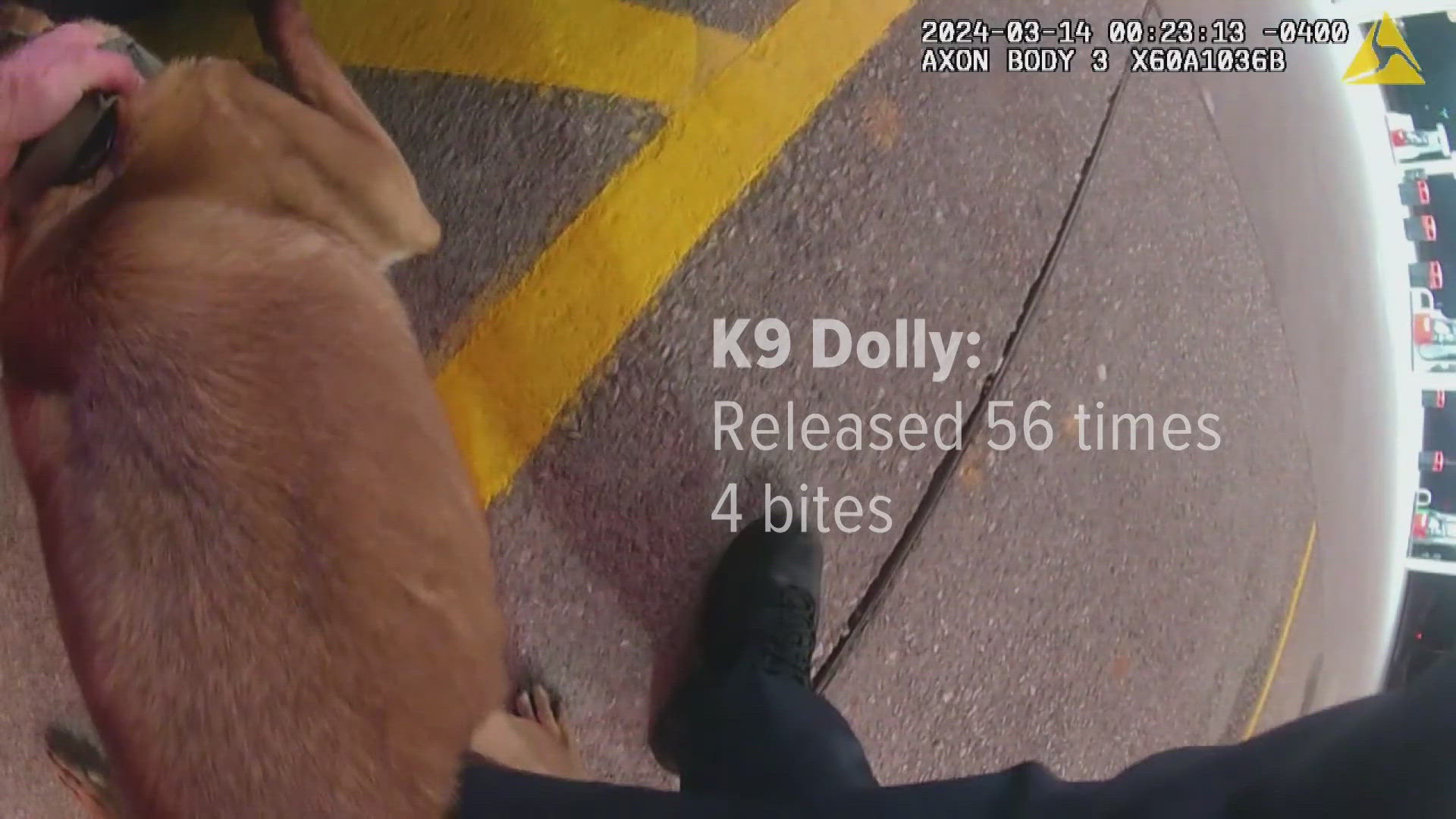LOS ANGELES — Protesters and police clashed Monday at the University of Texas in a confrontation that resulted in dozens of arrests, and Columbia University began suspending students as colleges around the U.S. begged pro-Palestinian demonstrators to clear out tent encampments as commencement ceremonies approach.
From coast to coast, demonstrators are sparring over the Israel-Hamas war and its mounting death toll, and the number of arrests at campuses nationwide is approaching 1,000 as the final days of class wrap up. The outcry is forcing colleges to reckon with their financial ties to Israel, as well as their support for free speech. Some Jewish students say the protests have veered into antisemitism and made them afraid to set foot on campus.
The protests have even spread to Europe, with French police removing dozens of students from the Sorbonne university after pro-Palestinian protesters occupied the main courtyard. In Canada, student protest camps have popped up at the University of Ottawa, McGill University in Montreal and the University of British Columbia in Vancouver, The Canadian Press reported.


At the University of Texas at Austin, an attorney said at least 40 demonstrators had been arrested Monday on charges of trespassing and disorderly conduct, some of them by officers in riot gear who encircled about 100 sitting protesters, dragging or carrying them out one by one amid screams. Another group of demonstrators trapped police and a van full of arrestees between buildings, creating a mass of bodies pushing and shoving and prompting the officers to use pepper spray and flash-bang devices to clear the crowd.
The confrontation was an escalation on the 53,000-student campus in the state's capital, where more than 50 protesters were arrested last week.
The university late Monday issued a statement saying that many of Monday's protesters were not affiliated with the school and that encampments are prohibited on campus. The school also alleged that some demonstrators were “physically and verbally combative" with university staff, prompting officials to call law enforcement.
The plight of students who have been arrested has become a central part of protests, with the students and a growing number of faculty demanding amnesty for protesters. At issue is whether the suspensions and legal records will follow students through their adult lives.
The Texas protest and others grew out of Columbia's early demonstrations that have continued. On Monday, student activists on the school's Manhattan campus defied a 2 p.m. deadline to leave an encampment of around 120 tents. If they left by the deadline and signed a form committing to abide by university policies through June 2025, officials said they could finish the semester in good standing. If not, they would be suspended, pending further investigation.


Instead, hundreds of protesters remained, marching around the quad and weaving around piles of temporary flooring and green carpeting meant for graduation ceremonies that are supposed to begin next week.
A handful of counter-demonstrators waved Israeli flags, and one held a sign reading, “Where are the anti-Hamas chants?”
While the university didn’t call police to roust the demonstrators, school spokesperson Ben Chang said suspensions had started. He said that while the university appreciated the free speech rights of students, the encampment was a “noisy distraction” that was interfering with teaching and preparation for final exams. The university said it will offer an alternative venue for the protests after exams and graduation.
The protests also made some Jewish students deeply uncomfortable, he said.
Few other details from the university were immediately available, such as how students were involved, how the suspensions would be carried out or whether suspended students would be ejected from the campus. Protest organizers said they were not aware of any suspensions as of Monday evening.
Columbia’s handling of the protests also has prompted federal complaints.
A class-action lawsuit on behalf of Jewish students alleges a breach of contract by Columbia, claiming the university failed to maintain a safe learning environment, despite policies and promises. It also challenges the move away from in-person classes and seeks quick court action requiring Columbia to provide security for the students.
Meanwhile, a legal group representing pro-Palestinian students is urging the U.S. Department of Education’s civil rights office to investigate Columbia’s compliance with the Civil Rights Act of 1964 for how they have been treated.
A university spokesperson declined to comment on the complaints.
In a rare case, Northwestern University said it reached an agreement with students and faculty who represent the majority of protesters on its campus near Chicago. It allows peaceful demonstrations through the June 1 end of spring classes and in exchange, requires removal of all tents except one for aid, and restricts the demonstration area to allow only students, faculty and staff unless the university approves otherwise.
At the University of Southern California, organizers of a large encampment sat down with university President Carol Folt for about 90 minutes on Monday. Folt declined to discuss details of what was discussed, but said the purpose of the meeting was to allow her to hear the concerns of protesters.
USC sparked a controversy April 15 when officials refused to allow the valedictorian, who has publicly supported Palestinians, to make a commencement speech, citing nonspecific security concerns for their rare decision. Administrators then scrapped the keynote speech by filmmaker Jon M. Chu, who is an alumnus, and declined to award any honorary degrees.
The backlash, as well as Columbia's demonstrations, inspired the encampment and protests on campus last week week where 90 people were arrested by police in riot gear. The university has canceled its main graduation event that typically draws 65,000 people to the Los Angeles campus.
“The students said at the end they wouldn’t have considered this meeting a win from their perspective, and I can fully appreciate that,” Folt said in a statement late Monday. “For me, the most important point was that we were starting to talk, and I think that was vital.”
Another meeting between Folt and protesters was scheduled for Tuesday.
Administrators elsewhere tried to salvage their commencements and several have ordered the clearing of encampments in recent days. When those efforts have failed, officials threatened discipline, including suspension, and possible arrest.
But students dug in their heels at other high-profile universities, with standoffs continuing at Harvard, the University of Pennsylvania, Yale and others. Police in riot gear at Virginia Commonwealth University sought to break up an encampment there late Monday, clashing with protesters and deploying pepper spray and zip-ties to take them into custody.
Jacob Ginn, a second-year University of North Carolina sociology graduate student, said he had been protesting at the encampment for four days, including negotiations with administrators Friday.
“We are prepared for everything and we will remain here until the university meets our demands and we will remain steadfast and strong in the face of any brutality and repression that they try to attack us with,” Ginn said in reference to a potential police sweep of the encampment.
HOW IT STARTED
The nationwide campus protests began as a response by some students to Israel’s offensive in Gaza after Hamas launched a deadly attack on southern Israel on Oct. 7.
Militants killed about 1,200 people, most of them civilians, and took roughly 250 hostages. Vowing to stamp out Hamas, Israel has killed more than 34,000 Palestinians in the Gaza Strip, according to the local health ministry.
Israel and its supporters have branded the university protests as antisemitic, while critics of Israel say it uses such allegations to silence opponents. Although some protesters have been caught on camera making antisemitic remarks or violent threats, organizers of the protests, some of whom are Jewish, say it is a peaceful movement aimed at defending Palestinian rights and protesting the war.
Student demonstrations have sprung up across the U.S. in various locations including New York, California, Missouri, Indiana, Massachusetts, Vermont and Virginia.
NEW YORK
Early protests at Columbia University in New York City, where demonstrators set up tents in the center of the campus, sparked pro-Palestinian demonstrations across the country. The demonstrations have caused the school to hold remote classes.
Columbia set a series of deadlines for protesters to leave the encampment, which they have missed, but the school said in an email to students that bringing back police “at this time” would be counterproductive. The students and administrators have engaged in negotiations to end the disruptions, but the sides have not come to an agreement, university President Minouche Shafik said in a statement Monday.
On Sunday, students walked among dozens of colorful tents in front of Low Library, where rows of chairs already have been set up in preparation for commencement in May.
CALIFORNIA
At UCLA, police set up barricades before hundreds of demonstrators on both sides joined a growing crowd Sunday near tents where pro-Palestinian students have been staying around-the-clock.
Pro-Israel demonstrators who arrived for a “Stand in Support of Jewish Students” rally said their goal was to “stand up against hatred and antisemitism.” The counterprotest was organized by the Israeli-American Council, whose leader Elan Carr urged marchers to remain peaceful, the Los Angeles Times reported.
Across town, the University of Southern California said it was open Sunday after administrators shut down the campus a day earlier because of what the school called vandalism and disruptions.
USC drew criticism after refusing to allow this year's class valedictorian, who has publicly supported the Palestinian cause, to make a commencement speech. Administrators then scrapped the keynote speech by filmmaker Jon M. Chu. Last week the school announced the cancellation of its main graduation event, a day after more than 90 protesters were arrested by police in riot gear.
In the northern part of the state, officials Saturday ordered an “enforced hard closure” of California State Polytechnic University, Humboldt. Two halls remained occupied by pro-Palestinian demonstrators.
MISSOURI
Washington University in St. Louis locked some campus buildings and arrested protesters Saturday. Photos showed uniformed police attempting to remove masked protesters as others, also wearing masks, linked arms to thwart the efforts.
The university said in a statement that more than 100 people, including 23 students and four university employees, were arrested on suspicion of trespassing. Megan Green, president of the St. Louis Board of Aldermen, said in a social media post that she was present and the protest remained calm “until the police came in like an ambush.”
Green Party presidential candidate Jill Stein said in a social media post that she and two of her campaign managers were among those arrested.
The university’s statement defended the action and said protesters “did not have good intentions on our campus and that this demonstration had the potential to get out of control and become dangerous.”
MASSACHUSETTS
Police in riot gear cleared an encampment at Northeastern University in Boston on Saturday. About 100 protesters were arrested and will be charged with trespassing and disorderly conduct, the Massachusetts State Police said.
Boston's Emerson College said in a statement Sunday that it will not bring disciplinary charges against over 100 protesters who were arrested last week and will encourage prosecutors not to issue charges for encampment-related violations.
At Boston's Tufts University, the school said in a statement that staffers would reach out to protesters Monday to plan for the end of an encampment in coming days.
VIRGINIA
There were an unknown number of arrests over the weekend at a protest at Virginia Tech in Blacksburg, a university spokesperson said Monday.
Protesters began occupying the lawn of the graduate life center Friday, the university said in a statement. The gathering violated university policy, the school said, but there was a “safe and peaceful environment” over much of the weekend.



